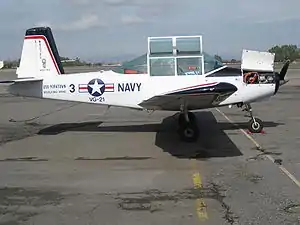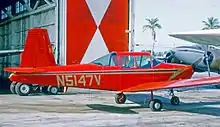Varga 2150 Kachina
The Varga 2150 Kachina is an American all-metal, low-wing, fixed-gear, two-seat light aircraft fitted with a tricycle undercarriage.
| 2150 Kachina | |
|---|---|
 | |
| Varga 2150A Kachina at McClellan-Palomar Airport California in January 2008 | |
| Role | personal, primary trainer |
| National origin | United States |
| Manufacturer | Morrisey, Shinn, Varga |
| Designer | William J. Morrisey |
| First flight | 1958 |
| Developed from | Morrisey Nifty |
Design
In 1948, US aircraft test pilot/aircraft designer W.J. Morrisey produced a wood-and-fabric light aircraft, the 1000C (Nifty). In 1958 he reworked that basic design, giving it an all-metal structure and increased power. The aircraft is a cantilever low-wing monoplane with plain ailerons and two-position trailing-edge flaps, conventional empennage, fixed nosewheel landing gear, and tandem seating. Dual controls are provided as standard equipment.
Development
In 1958 The Morrisey Aviation Inc. company began building the re-designed aircraft. Two units were completed as the Morrisey 2000.[1] A further improvement came with the Morrisey 2150, incorporating a 108 hp Lycoming O-235 engine. The company built nine aircraft by the end of 1959.[2]

The construction and design rights were then sold to Shinn Engineering Inc. which built 35 improved Shinn 2150A aircraft with a 150 hp (110 kW) Lycoming O-320-A2C engine, before ceasing production in 1962.[3]
The 2150A design rights were sold in 1967 to used aircraft parts supplier George Varga who formed the Varga Aircraft Corporation. The Varga 2150A Kachina was built at Chandler, Arizona between 1975 and 1982. 121 2150A Kachinas were completed together with 18 examples of the Varga 2180 with a 180 hp Lycoming O-360-A2D engine. A tailwheel option was available as the Varga 2150TG.[3][4]
Bill Morrisey later re-acquired the design rights and then launched a kit version of the original Morrisey 2000C.
The Morrisey/Shinn/Varga 2150 remains in widespread use in the US and several aircraft are flown in Europe and South America.[5]
Variants
- Morrisey 2000C
- Variant with Lycoming O-235 engine[2]
- Morrisey 2150
- Variant with Lycoming O-320-A2C engine.[6]
- Shinn 2150
- Morrisey 2150 built by Shinn Engineering.[6]
- Varga 2150A Kachina
- Morrisey 2150 built by Varga Aircraft.[6]
- Varga 2150TG
- Tailwheel version of the 2150A[3]
- Varga 2180 Kachina
- Variant with Lycoming O-360-A2D engine.[6]
Specifications (2150A)
Data from Jane's All the World's Aircraft 1982-83[7] Jane's All the World's Aircraft 1977–78[8]
General characteristics
- Crew: 2
- Length: 21 ft 2 in (6.45 m)
- Wingspan: 30 ft 0 in (9.14 m)
- Height: 7 ft 0 in (2.13 m)
- Wing area: 144.0 sq ft (13.38 m2)
- Empty weight: 1,124 lb (510 kg)
- Max takeoff weight: 1,817 lb (824 kg) normal category
- Fuel capacity: fuel:132.5 l (29.1 imp gal; 35.0 US gal), oil:7.5 l (1.6 imp gal; 2.0 US gal)
- Powerplant: 1 × Lycoming O-320-A2C 4-cyl. air-cooled horizontally-opposed piston engine, 150 hp (112 kW)
- Propellers: 2-bladed Sensenich M74DM fixed pitch propeller, 6 ft 2 in (1.88 m) diameter
Performance
- Maximum speed: 128 kn (147 mph, 237 km/h)
- Cruise speed: 117 kn (135 mph, 217 km/h) 75% power, 110 kn (200 km/h; 130 mph) 65% power
- Stall speed: 49.5 kn (57.0 mph, 91.7 km/h) flaps up, 45 kn (83 km/h; 52 mph) flaps down
- Never exceed speed: 147.5 kn (169.7 mph, 273.2 km/h)
- Range: 455 nmi (524 mi, 843 km)
- Service ceiling: 21,998 ft (6,705 m)
- Rate of climb: 1,450 ft/min (7.4 m/s)
- Wing loading: 12.6 lb/sq ft (61.6 kg/m2)
- Power/mass: 0.083 hp/lb (0.136 kW/kg) note: kW/Kg num is actually the ~hp/lb value. kW/Kg appears to be conversion factor of the other.
- Take-off run to 49 ft (15 m): 440 ft (134 m)
- Landing run from 49 ft (15 m): 449 ft (137 m)
Notes
- Green 1965, p. 295
- Simpson 2001 p. 565
- Simpson 2005, p. 201
- Kieth Connes (October 1977). "Varga Kachina". Air Progress.
- Simpson 2001, p. 565
- The Illustrated Encyclopedia of Aircraft, p. 2560
- Taylor, John W. R. (1983). Jane's All the World's Aircraft 1982-83. London: Jane's Publishing Company. ISBN 0-7106-0748-2.
- Taylor, John W. R. (1978). Jane's All the World's Aircraft 1977-78. London: Jane's Publishing Company. pp. 417–418. ISBN 0531032787.
References
- Taylor, John W. R. (1983). Jane's All the World's Aircraft 1982-83. London: Jane's Publishing Company. ISBN 0-7106-0748-2.
- Green, William (1965). The Aircraft of the World. Macdonald & Co (Publishers) Ltd.
- The Illustrated Encyclopedia of Aircraft. London: Aerospace Publishing.
- Taylor, John W. R. (1978). Jane's All the World's Aircraft 1977-78. London: Jane's Publishing Company. pp. 417–418. ISBN 0531032787.
| Wikimedia Commons has media related to Varga 2150 Kachina. |